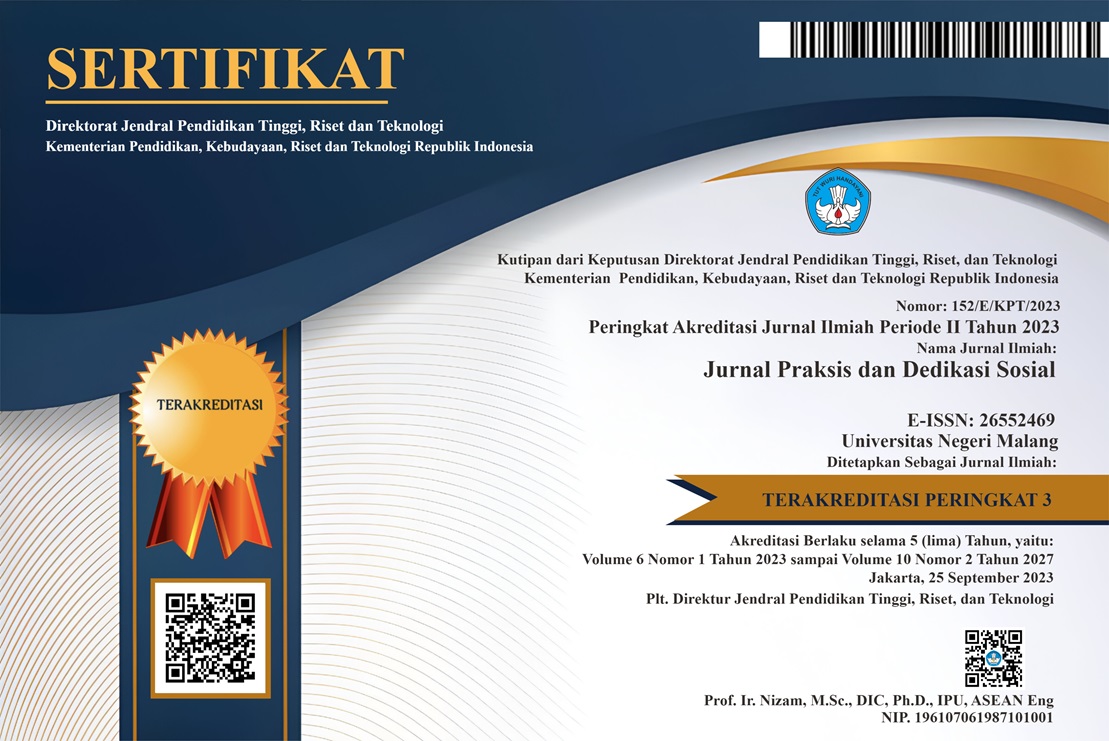PELUANG DAN TANTANGAN MENINGKATKAN KETERLIBATAN WARGA NEGARA MUDA DALAM MEMPROMOSIKAN PERDAMAIAN DI MASYARAKAT
Abstract
OPPORTUNITIES AND CHALLENGES OF INCREASING THE INVOLVEMENT OF YOUNG CITIZENS IN PROMOTING PEACE IN COMMUNITIES
In the current era where everyone has the convenience of interacting and communicating with each other across regional boundaries, student interest in gaining learning experiences not only in the "classroom" is also higher. Especially on content that tends to be theoretical like peace. Therefore, this article aims to discuss the service-learning learning model combined with peace education and the perspective of increasing citizen engagement which is the focus of this study. The method used is a qualitative approach with a participatory design involving lecturers and students in the Social Praxis course at the Department of Law and Citizenship, Faculty of Social Sciences. The results of the study show that: 1) the implementation of the learning model has the opportunity to increase the knowledge, skills and involvement of young citizens in promoting peace in society through material deepening activities, preparation of activity plans, to implementing peace education programs in the community; 2) the challenge of implementing the learning model is the development of a paradigm about the concept of imaginary peace in society with the category of social media users, so that students need to get more intense deepening of the material about this; 3) evaluation of the implementation of the learning model is an improvement in the intensity of guiding student activity designs by lecturers in Social Praxis courses to improve the quality of programs run by students. In general, it can be said that the service-learning model implemented could support increased student involvement as citizens in solving citizenship issues around them. As a follow-up, further studies are still needed on the effectiveness and efficiency of the program with the perspective of its benefit to the community so that a complete revision of a better learning model can be formulated.
Pada era saat ini dimana setiap orang mendapatkan kemudahan untuk saling berinteraksi dan berkomunikasi melintasi batas wilayah, ketertarikan mahasiswa untuk memperoleh pengalaman belajar tidak hanya pada “ruang kelas” juga menjadi lebih tinggi. Terutama pada konten yang cenderung teoritis seperti perdamaian. Oleh karena itu, artikel ini bertujuan untuk membahas model pembelajaran service-learning yang dipadukan dengan pendidikan damai dan perspektif meningkatkan keterlibatan warga negara menjadi fokus utama kajian ini. Metode yang digunakan adalah pendekatan kualitatif dengan desain partisipatif yang melibatkan dosen serta mahasiswa pada mata kuliah Praksis Sosial di Jurusan Hukum dan Kewarganegaraan, Fakultas Ilmu Sosial. Hasil kajian menunjukkan bahwa: 1) implementasi model pembelajaran berpeluang meningkatkan pengetahuan, keterampilan, dan keterlibatan warga negara muda dalam mempromosikan perdamaian di masyarakat melalui kegiatan pendalaman materi, penyusunan rencana kegiatan, hingga pelaksanaan program edukasi perdamaian di masyarakat; 2) tantangan dari implementasi model pembelajaran yaitu perkembangan paradigma tentang konsep perdamaian yang imajiner di masyarakat dengan kategori pengguna media sosial, sehingga mahasiswa perlu untuk mendapatkan pendalaman materi yang lebih intens tentang hal tersebut; 3) evaluasi dari implementasi model pembelajaran adalah perbaikan pada intensitas pembimbingan rancangan kegiatan mahasiswa oleh dosen pengampu mata kuliah Praksis Sosial untuk meningkatkan kualitas program yang dijalankan oleh mahasiswa. Secara umum, dapat dikatakan bahwa model pembelajaran service-learning yang dilaksanakan berpeluang mendukung peningkatan keterlibatan mahasiswa sebagai warga negara dalam penyelesaian isu-isu kewarganegaraan di sekitarnya. Sebagai tindak lanjut, tetap diperlukan kajian lanjutan tentang efektivitas dan efisiensi program dengan perspektif kebermanfaatannya bagi masyarakat agar dapat dirumuskan sebuah revisi utuh model pembelajaran yang lebih baik.
Keywords
Full Text:
PDFReferences
Adha, M. M., Budimansyah, D., Sapriya, S., & Sundawa, D. (2018). Volunteerism through festivals for civic virtue. Proceeding of The 2nd International Conference on Sociology Education, 500–505.
Angelia, N. I. P. (2021). Cyber troops in social media propaganda and threats to Indonesian democracy. Proceeding International Conference Faculty of Law, 1(1), 166–176.
Asaba, E., & Suarez-Balcazar, Y. (2018). Participatory research: A promising approach to promote meaningful engagement. Scandinavian Journal of Occupational Therapy, Vol. 25, pp. 309–312. Taylor & Francis.
de Figueiredo, A. D. (2005). Learning contexts: A blueprint for research. Interactive Educational Multimedia, 127–139.
Dwidienawati, D., & Gandasari, D. (2018). Understanding Indonesia’s generation Z. International Journal of Engineering & Technology, 7(3), 245–253.
Etmanski, C., & Pant, M. (2007). Teaching participatory research through reflexivity and relationship: Reflections on an international collaborative curriculum project between the Society for Participatory Research in Asia (PRIA) and the University of Victoria (UVic). Action Research, 5(3), 275–292.
Gusmadi, S. (2018). Keterlibatan warga negara (civic engagement) dalam penguatan karakter peduli lingkungan. Mawa’izh: Jurnal Dakwah dan Pengembangan Sosial Kemanusiaan, 9(1), 105–117. https://doi.org/10.14421/musawa.1.171.32-50
Hancock, B., Ockleford, E., & Windridge, K. (2001). An introduction to qualitative research. Trent focus group London.
Handoyo, L. D. (2015). Penerapan service learning untuk meningkatkan kepedulian sosial mahasiswa terhadap masalah ketahanan pangan. Jurnal Penelitian, 18(2), 132–142.
Kistner, S., Rakoczy, K., Otto, B., Klieme, E., & Büttner, G. (2015). Teaching learning strategies. The role of instructional context and teacher beliefs. Journal for Educational Research Online, 7(1), 176–197.
Listyono, Y. M. (2020). The role of communication in organizational conflict management at PT. Sinar Makmur Nusa Tenggara. Mediator: Jurnal Komunikasi, 13(2), 156–166.
Mahpudz, A., & Palimbong, A. (2020). Tolerance learning to develop students social skills in the 21st Century. International Conference on Social Studies, Globalisation And Technology (ICSSGT 2019), 169–178. Atlantis Press.
Male, T. (2016). Digital technologies: Implications for educational organisations and settings in the twenty-first century. EducationalFutures, 7(3), 5–25.
Mawarti, R. A., Habibi, M. M., Alfaqi, M. Z., & Shofa, A. M. A. (2022). Strategy for building political literacy through peace education in society. KnE Social Sciences, 603–614.
Setyowati, E., & Permata, A. (2018). Service learning: Mengintegrasikan tujuan akademik dan pendidikan karakter peserta didik melalui pengabdian kepada masyarakat. Bakti Budaya, 1(2), 143–192. https://doi.org/10.22146/bb.41076
Vaughn, L. M., & Jacquez, F. (2020). Participatory research methods–choice points in the research process. Journal of Participatory Research Methods, 1(1), 1–13.
Wijaya, E. Y., Sudjimat, D. A., Nyoto, A., & Malang, U. N. (2016). Transformasi pendidikan abad 21 sebagai tuntutan pengembangan sumber daya manusia di era global. Prosiding Seminar Nasional Pendidikan Matematika, 1(26), 263–278.
DOI: http://dx.doi.org/10.17977/um032v6i2p93-100
Refbacks
- There are currently no refbacks.
Copyright (c) 2023 Jurnal Praksis dan Dedikasi Sosial (JPDS)

This work is licensed under a Creative Commons Attribution-ShareAlike 4.0 International License.
Editorial and Administration Office:
This Journal is published by Universitas Negeri Malang, under the management of Faculty of Social Science.
Semarang St. No. 5 Building I3, Pos Code: 65145.
Phone. (0341) 551312.
Homepage: http://journal2.um.ac.id/index.php/jpds/index
E-ISSN 2655-2469
Jurnal Praksis dan Dedikasi Sosial (JPDS) is licensed under Creative Commons Attribution-ShareAlike 4.0 International License,








